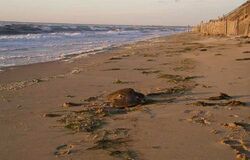Biology:Cold-stunning

Cold-stunning, also known as hypothermic stunning, is a hypothermic reaction experienced by marine reptiles, notably sea turtles, when exposed to cold water for prolonged periods, which causes them to become weak and inactive. Cold-stunned sea turtles may float to the surface and be further exposed to cold temperatures, which can cause them to drown.[1] A water temperature threshold of 8[2]–10 °C[3] has been associated with mass turtle stunning events. After cold-stunning has taken place, there is only a very short period of time when sea turtles can be safely rescued.[4]
One study indicates that ocean warming has led to an increase in cold-stunning events in the northwest Atlantic.[5]
Notable instances
In 2016, 1,700 turtles were cold-stunned in North Carolina, following "an unusually temperate fall and early winter".[6]
In 2021, nearly 5,000 cold-stunned turtles were rescued in Texas during a winter storm;[7] it has been called the largest cold-stunning event to be documented in the state.[8]
See also
References
- ↑ "Cold-Stunning and Sea Turtles – Frequently Asked Questions" (in en). 2021-02-11. https://www.fisheries.noaa.gov/national/marine-life-distress/cold-stunning-and-sea-turtles-frequently-asked-questions.
- ↑ Shaver, Donna J.; Tissot, Philippe E.; Streich, Mary M.; Walker, Jennifer Shelby; Rubio, Cynthia; Amos, Anthony F.; George, Jeffrey A.; Pasawicz, Michelle R. (2017-03-17). "Hypothermic stunning of green sea turtles in a western Gulf of Mexico foraging habitat" (in en). PLOS ONE 12 (3): e0173920. doi:10.1371/journal.pone.0173920. PMID 28306747. Bibcode: 2017PLoSO..1273920S.
- ↑ "Cold Stunned Sea Turtles" (in en). https://www.nps.gov/pais/learn/nature/cold-stunned-sea-turtles.htm.
- ↑ Roberts, Kelsey; Collins, Jennifer; Paxton, Charles H.; Hardy, Robert; Downs, Joni (2014-04-07). "Weather patterns associated with green turtle hypothermic stunning events in St. Joseph Bay and Mosquito Lagoon, Florida" (in en). Physical Geography 35 (2): 134–150. doi:10.1080/02723646.2014.898573. https://www.tandfonline.com/doi/full/10.1080/02723646.2014.898573.
- ↑ Griffin, Lucas P.; Griffin, Curtice R.; Finn, John T.; Prescott, Robert L.; Faherty, Mark; Still, Brett M.; Danylchuk, Andy J. (2019-01-29). "Warming seas increase cold-stunning events for Kemp's ridley sea turtles in the northwest Atlantic" (in en). PLOS ONE 14 (1): e0211503. doi:10.1371/journal.pone.0211503. PMID 30695074. Bibcode: 2019PLoSO..1411503G.
- ↑ Christiansen, Emily F. Finn; Harms, Craig A.; Godfrey, Matthew H.; Finn, Sarah A. (2016). "2016 North Carolina Sea Turtle Cold Stunning Event". 47th Annual International Association for Aquatic Animal Medicine (IAAAM) Meeting & Conference. Virginia Beach, VA. https://www.vin.com/apputil/content/defaultadv1.aspx?pId=14818&catId=75132&id=7312282.
- ↑ Daly, Natasha (2021-02-19). "Nearly 5,000 sea turtles rescued from freezing waters on Texas island" (in en). https://www.nationalgeographic.com/animals/article/nearly-5000-sea-turtles-rescued-from-freezing-waters-on-texas-island.
- ↑ DeSantis, Rachel; Aradillas, Elaine (2021-02-18). "Local Sea Turtle Expert Calls 'Cold-Stunning' Event the 'Largest' That's Been Documented in Texas" (in en). https://people.com/human-interest/thousands-of-sea-turtles-in-texas-have-been-cold-stunned-by-winter-storm/.
 |

